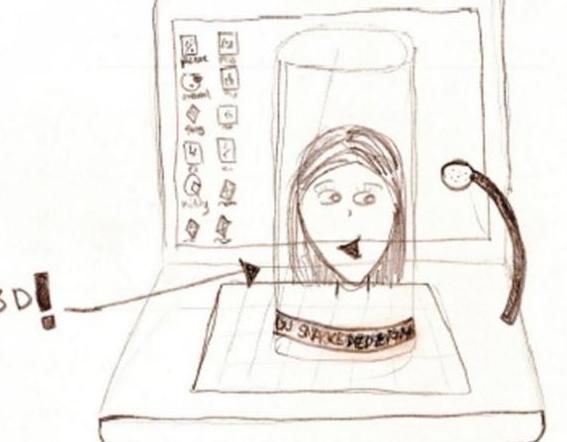Kids Likely to Predict Future of Technology

Kids may have a knack for predicting the future technology, according to a new study.
A report from international research consultancy firm Latitude found that kids are predicting that the future of media and technology lies in better integrating digital experiences with real-world places and activities, citing some initiatives that are already on the horizon.
Children across the world anticipate recent updates to Google image search, new applications for robots, real-world gaming and other cutting-edge possibilities for tech. They're also suggesting that more intuitive, human-like interactions with devices, such as those provided by fluid interfaces or robots, are a key area for development.
The findings are a result of asking kids across the world to draw the answer to this question: "What would you like your computer or the Internet to do that it can’t do right now?"
"Across a variety of creative exercises, kids from all over the world have proven, time and again, that they think in extraordinarily sophisticated ways about how tech could enhance their learning, play, and interactions with the people and things around them – and the ways that technology might help us solve the big global problems we all face," said Steve Mushkin, founder and president of Latitude.
Overall, the drawings demonstrated that kids wanted their technology to be more interactive and human, better integrated with their physical lives and empowering to users by assisting new knowledge or abilities.
For example, some study participants imagined technologies that are just beginning to appear in tech-forward circles, such as Google's revamped image search, which was announced on June 14th 2011. This allows users to place images, rather than text, in Google's search box to perform a query.
Sign up for the Live Science daily newsletter now
Get the world’s most fascinating discoveries delivered straight to your inbox.
The majority of kids (77 percent) imagined technologies with more intuitive modes of input and human-level interactions, such as verbal, gestural, and even telepathic responses.
"Kids are asking for computers to look, feel, sound, act – and interact – more like humans," said Jessica Reinis, a senior research analyst at Latitude, who led the study. "In many cases, it's not enough to have a machine that simply completes a task for them. Kids today have a strong bent towards independent learning, creation and artistic endeavors, and they’re looking for technologies that can teach them and really engage them in new ways."
One-third of kids invented technologies that would empower them by fostering knowledge or otherwise "adult" skills, such as speaking a different language or learning how to cook.
Some participants moved beyond personal development, envisioning technologies that could foster positive social connections or influence behaviors tied to sustainability.
The lines between 'online' and 'offline' and 'virtual' and 'real' distinctions are also disappearing, the report notes.
"[Kids] naturally think about a future in which traditionally 'online' interactions make their way into the physical world, and vice versa – a concept already playing out in augmented reality, transmedia storytelling and other recent tech developments," Mushkin said.
This story was provided by InnovationNewsDaily, sister site to Live Science. Follow InnovationNewsDaily on Twitter @News_Innovation, or on Facebook.













